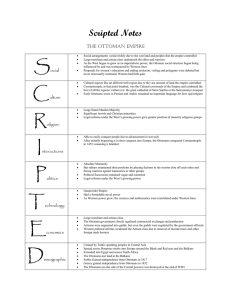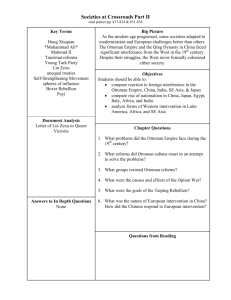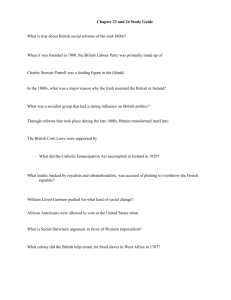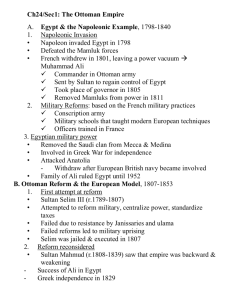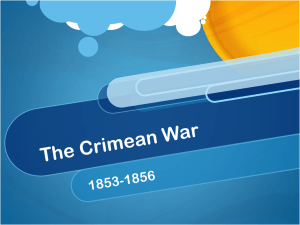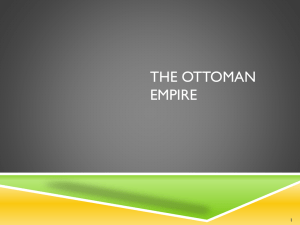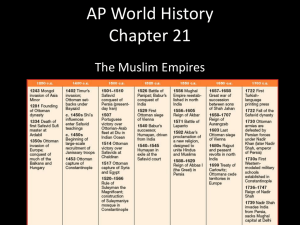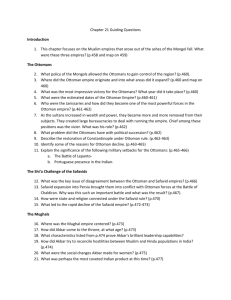Societies at Crossroads
advertisement
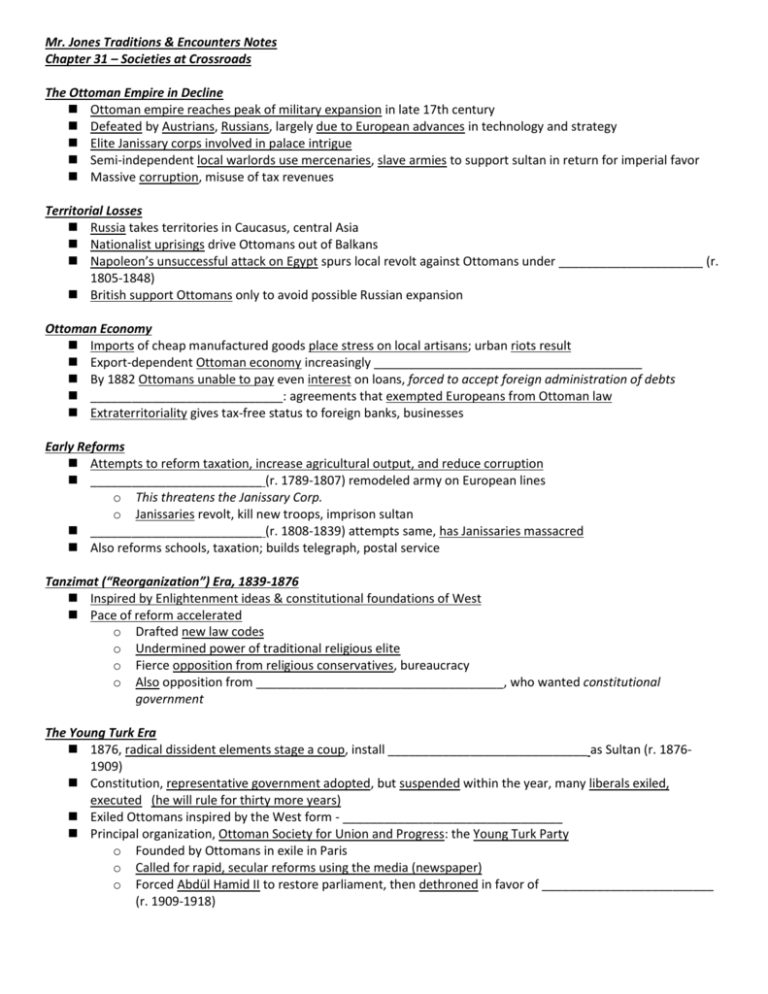
Mr. Jones Traditions & Encounters Notes Chapter 31 – Societies at Crossroads The Ottoman Empire in Decline Ottoman empire reaches peak of military expansion in late 17th century Defeated by Austrians, Russians, largely due to European advances in technology and strategy Elite Janissary corps involved in palace intrigue Semi-independent local warlords use mercenaries, slave armies to support sultan in return for imperial favor Massive corruption, misuse of tax revenues Territorial Losses Russia takes territories in Caucasus, central Asia Nationalist uprisings drive Ottomans out of Balkans Napoleon’s unsuccessful attack on Egypt spurs local revolt against Ottomans under _____________________ (r. 1805-1848) British support Ottomans only to avoid possible Russian expansion Ottoman Economy Imports of cheap manufactured goods place stress on local artisans; urban riots result Export-dependent Ottoman economy increasingly _______________________________________ By 1882 Ottomans unable to pay even interest on loans, forced to accept foreign administration of debts ____________________________: agreements that exempted Europeans from Ottoman law Extraterritoriality gives tax-free status to foreign banks, businesses Early Reforms Attempts to reform taxation, increase agricultural output, and reduce corruption _________________________ (r. 1789-1807) remodeled army on European lines o This threatens the Janissary Corp. o Janissaries revolt, kill new troops, imprison sultan _________________________ (r. 1808-1839) attempts same, has Janissaries massacred Also reforms schools, taxation; builds telegraph, postal service Tanzimat (“Reorganization”) Era, 1839-1876 Inspired by Enlightenment ideas & constitutional foundations of West Pace of reform accelerated o Drafted new law codes o Undermined power of traditional religious elite o Fierce opposition from religious conservatives, bureaucracy o Also opposition from ____________________________________, who wanted constitutional government The Young Turk Era 1876, radical dissident elements stage a coup, install _____________________________ as Sultan (r. 18761909) Constitution, representative government adopted, but suspended within the year, many liberals exiled, executed (he will rule for thirty more years) Exiled Ottomans inspired by the West form - ________________________________ Principal organization, Ottoman Society for Union and Progress: the Young Turk Party o Founded by Ottomans in exile in Paris o Called for rapid, secular reforms using the media (newspaper) o Forced Abdül Hamid II to restore parliament, then dethroned in favor of _________________________ (r. 1909-1918) Young Turk Rule Attempted to establish Turkish domination over far-flung empire Turkish made official language, despite large numbers of Arabic and Slavic language speakers Yet could not contain forces of decline The Russian Empire Under Pressure Russia a massive, multi-cultural empire o Only approximately half speak Russian, observe Russian Orthodox Christianity Romanov tsars rule autocratic empire Powerful class of nobles exempt from taxation, military duty Exploitative serfdom The Crimean War, 1853-1856 Russian expansion into Caucasus in larger attempt to establish control over weakening Ottoman empire Threatens to upset balance of power; Europeans become involved Russia driven back from Crimea in ________________________________ Demonstration of Russian weakness in the face of western technology, strategy Reform: Emancipation of the Serfs Serfdom source of rural instability and peasant revolt ___________________________ begins to focus on social reforms Emancipates serfs in 1861, without alleviating poverty, land hunger Compensates landowners for the loss of land and the serfs who worked on it Limited attempts to reform administration Small-scale representative government Network of elected district assemblies called __________________________ Industrialization in Russia _____________________ Count Sergei Witte, minister of finance 1892-1903 Massive railroad construction ____________________________________________ But massive industrial discontent Peasants uprooted from rural lifestyle to work for low wages, long hours Repression ______________________________ spreads radical ideas for social change Socialists, anarchists Terror tactics, assassinations Attempt to connect with the mistrustful peasantry in 1870s, denounced and sent into Siberian exile Tsarist authorities turn to censorship, secret police Radicalization 1881 radical ____________________________________ assassinates Tsar Alexander II Prompted widespread attacks on Jews Angers the government; Reforms end! ____________________ (r. 1894-1917) enters into war with Japan ______________________________________________ (1904-1905) Humiliating defeat exposes government weaknesses Social discontent boils over in revolution of 1905 Strikes force government to make concessions

